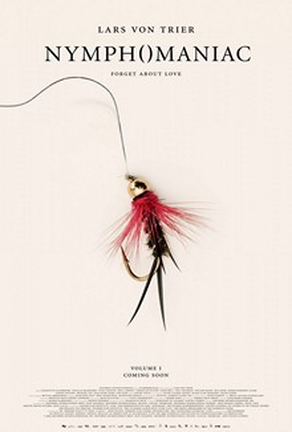SPECIAL FEATURE:
NYMPH()MANIAC, A FEMINIST ALLEGORY
BY JOWITA BYDLOWSKA
The Rusty Toque | Special Feature | Film Review | March 24, 2014
|
Nymph()maniac is a story of a woman in control. This is not how she is first presented—bruised and bloody, lying unconscious in a dark alley, until she is found by a passerby who brings her to his house where she tells him her life story. The woman’s name is Joe (played by Maja Arsovic, Ananya Berg, Stacy Martin and Charlotte Ginsbourg) and she tells her rescuer, Seligman (Stellan Skarsgård) that she is a bad human being; she describes her badness as “sin”. The force underlying Joe’s lust is guilt of the worst kind—it’s Christian guilt and nothing destroys sexuality like Church. (At one point Joe is in a group of friends chanting, “Mea Vulva, Mea Vulva, Mea Maxima Vulva” a twist on Mea Culpa, Mea Culpa, Mea Maxima Culpa: "through my fault, through my fault, through my most grievous fault"). Seligman points out the religious connotation of the word “sin”. As the movie unfolds, Seligman will make a number of interesting and not so interesting observations. I suspect some of the observations serve as decoys and have no bearing on the actual story.
Or I’m wrong and they do have bearing. There’s enough symbolism in Nymph()maniac to fuel essays like this one for the next few decades. Speaking of “wrong,” I’m also under the impression that this movie is receiving a lot of criticism because of its director, Lars Von Trier, who is not a nice person, and people tend to see this movie via the prism of who he is as a person (a misanthrope, hater of women, a Nazi, etcetera—he might or might not be any of these things). We live in a strange world where art is judged by the people who make it. I liked this movie a lot: for its cinematography and for the story and for the fact that it is a story with a straightforward theme. In fact, it is so straightforward that at one point, the movie’s resident Explainer, Seligman, points it out, and it sounds like feminism. In this case, Joe’s rejection of the expectations the world has of her gender. Is a male director allowed to make a movie about feminism? Is Joe allowed to do what she wants, sexually, despite being a female? I consider this movie a feminist movie in that it portrays a woman who does what she wants—from the moment she orchestrates to lose her virginity at 15. Joe is a woman whose wants make it impossible for her to fit in with the world—for example, her wants make it impossible for her to be a mother and a wife. Both—as explained by Seligman—the rejection of motherhood and wifehood are concepts that wouldn’t necessarily shock in a man but that are impossible to forgive in a woman. What other transgressions is Joe guilty of? She has a lot of sex and this sex might trouble some audiences—surely a woman could not want sex that much and would not be that risk-taking. Perhaps not, since the world is not an environment conducive to horny women, so we need to see Joe as a woman from out of this world. Proof: she says has sex up to 10 times a day, which probably shouldn’t be taken literally (she has a job, she has to eat and sleep—that on top of arranging all those encounters). This is a hyperbolic number that pushes the film from the realm of realism into that of allegory. (If there’s any doubt about this being a fairytale for grownups, there’s a moment in the movie where Joe recalls an improbable, fantastical coincidence—running into her lost love at a park that she frequents and catching him in a private moment of tearing up pictures of him and his wife. Seligman, the Explainer, challenges Joe on this coincidence—a big hint for us not to get hung up on this being a story based entirely on realistic events.) What is perhaps close to reality is Joe’s female boss forcing her to attend Sex Addict meetings because she believes Joe’s sexual conduct interferes with her job. She does not explain how but says that other employees are talking about Joe sleeping around. At the meetings, Joe is instructed to reject her sexuality (a.k.a. fitting into the world). But she rejects the group instead, reclaiming her self-description as “Nymphomaniac”—an outdated term used to sum up a woman who likes to fuck. (There are other words to describe this kind of woman such as “slut” or “whore.” We don’t have a better name for a woman who likes sex—although we have one for men, “Player,” which implies fun. Perhaps, in an attempt to justify this lack of name for a female Player, the director has given her a male name—Joe.) Early in her story, Joe talks about being unable to identify the men she sleeps with. There’s a funny sequence of penis shots (money shots?) that implies exactly how she sees the men she sleeps with (or, simply, how she objectifies them). But some of the male characters can be classified into categories—like Nymphomaniac and her costumes—for example, Older Man, Young Man, Fat Man, Animal-like Man, Husband, Sadist, and so on. There is also the Black Man (Black Men in this case), whom Joe refers to with a derogatory term. For that particular offence, she is scolded by Seligman, and she is unapologetic. As a Nymphomaniac, Joe too fits into types or subcategories of her type, as indicated by her costumes: the Teenager, the Mom, the Piano Teacher, the Secretary. All of these—male and female—categories can be easily found on any porn site, where many grownup fairytales live. (Or on IMDb under the Full Cast heading.) The first two men who stand out in this collection of types are the Father (botoxed Christian Slater) and the Husband (Shia LaBeouf mostly), and later Seligman (who is also Judas—religion, like sex, is problematic and frequently talked about in the movie). The Father is the truly innocent man and one Joe doesn’t have sex with. Yet, immediately, after the Father dies, Joe is aroused. The arousal might imply that his death, albeit emotionally shattering, is a form of release for Joe. The Father is also the one man who introduces Joe to things in which she found comfort throughout her personal torment—trees specifically, which he refers to as souls. (Personally, this was a distraction for me, too heavy-handed: lonely trees, lonely souls, thriving trees, thriving souls, etcetera.) The second man, the Husband, is a man Joe falls in love with. It doesn’t go well because she is unable to adjust to her role as Wife and he is unable to adjust to his role as a husband of a Nymphomaniac; at one point he aptly compares her to a tiger: no man can be married to a tiger. Another significant man is the Sadist (Jamie Bell). He serves as a kind of a tool necessary for Joe to regain her orgasm (which she lost after becoming a Wife). The only thing to snap Joe out of her numbness is pain to which she submits herself fully with complete abandon. The paradox of a genuine S&M relationship is that the submissive is the one in control. Submissives enter S&M relationships willingly and are the ones who establish boundaries. One of those boundaries is having a “safe word” where the dominant has to stop whatever torture is being inflicted on a submissive. In the movie there is no “safe word” but there doesn’t need to be because Joe’s abandon and appetite is bigger than her need of comfort. It is in fact so big that she is willing to sacrifice the well-being of her only child to fulfill her wants (another male, the Son, rejected perhaps because he’s a child). This phase is the apex of Joe’s nymphomania, the one time where it becomes truly sick. In this instance, addiction might be an apt term since addiction is something that profoundly interferes in someone’s life. But the life of a Mother and Wife is not the life Joe wants, and Joe is released from it. (It’s important to recall now her words at the beginning of the movie: “I was an addict out of lust, not out of need.” Her “addiction” is her choice.) Besides Men, there are female types too: the Boss, the Mother/“Cold Bitch” (Connie Nielsen), the Best Friend (Sophie Kennedy Clark), the Lover (Mia Goth). There is also the Cheated Wife (Uma Thurman), a figure of ridicule who serves as sort of a warning for Joe of what love looks like when it rots. The Lover is the one who conquers Joe or rather usurps her from her throne. It has to be another female, of course, since only a female would be her true equal. Joe tells her whole story to Seligman, who interprets what Joe tells him; in other words, he’s mansplaining. Sometimes his mansplaining makes sense (like when he summarizes what the movie is about) but sometimes it doesn’t, which Joe swiftly points out. Seligman’s interpretations are possibly mockery for what the audience will ascribe as meanings and symbolism of the movie. Additionally, his interpretations mock our panic over sex without meaning (just for pleasure and by a woman). Seligman is also the only man who truly betrays Joe in that he tries to take away the one thing she has: control. (Emphasis on “tries.”) The final type is the Director. That is to say we, who analyze this movie, try to make him into a type. The Nazi sympathizer. The Misogynist. The Male Director. Finally, and most appropriately, the Artist. He has refused to explain this movie; he is not giving interviews about it. As it is his right since the only thing he is in the context of this movie, is an artist. Art is not to be explained by its maker but to be interpreted by its audience. This was my interpretation. |
 Jowita Bydlowska
Jowita Bydlowska
JOWITA BYDLOWSKA is a Toronto-based writer. Her first book, a memoir called Drunk Mom, (Doubleday Canada, 2013) was a national bestseller.


